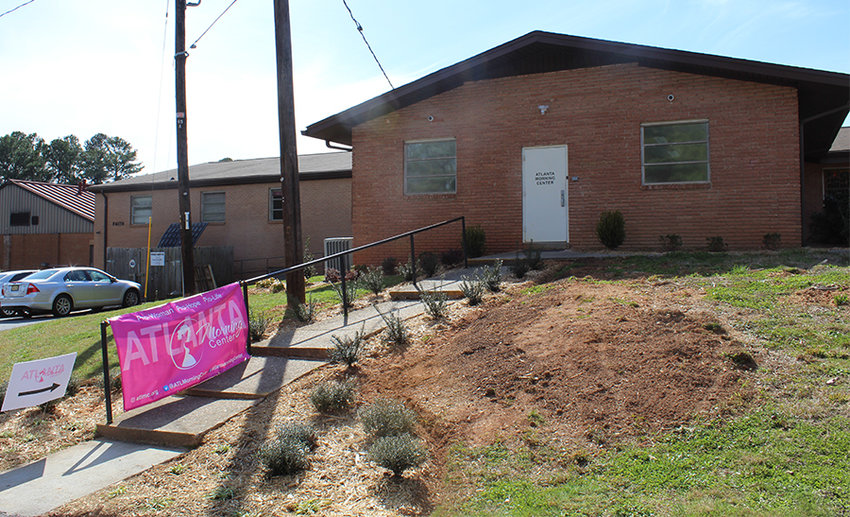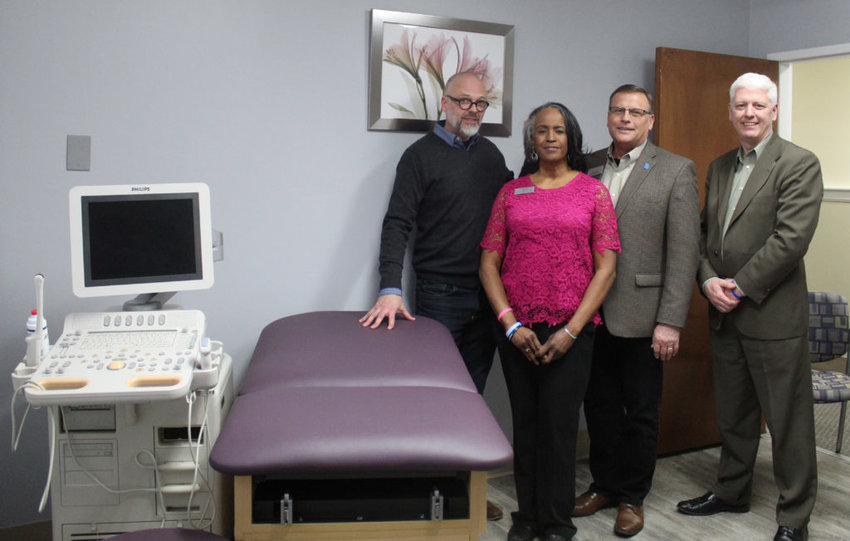Daphne Harris Nicely addresses a crowd at the dedication of the Atlanta Morning Center on the campus of Crossroads Church of Dunwoody on March 8. Less than two weeks later, it had to temporarily close its doors due to COVID-19. MYRIAH SNYDER/Index
DUNWOODY — Less than two weeks after the dedication of its facility, Atlanta Morning Center (ATLMC) had to put a halt on all in-person services due to the coronavirus pandemic.
Housed on the temporarily closed campus of Crossroads Church, Dunwoody, many of Atlanta Morning Center’s medical personnel are primary caregivers for the elderly or are staying home with children out of school at the moment.
Additionally, the center has been unable to obtain some medical supplies needed to safely operate (masks, hand sanitizer) and the price for others, such as gloves, has increased.
But, while ATLMC is consulting with the various other affiliated organizations to “explore strategies and alternative ways to serve” the community, Daphne Harris Nicely, ATLMC’s executive director, shared, the need for the type of care they provide is great.
Atlanta Morning Center isn’t a pregnancy resource center, Matt Larson, national director of Morning Center, explained. It’s the “next piece in the pro-life ecosystem. [A mother] decides to keep the baby. Now what?”

“We’re the ‘now what,’” he said.
“This is a restoring ministry,” he added. “The real success for me is when we see a family plug into the church, and they come back and volunteer. I want to shift culture.”
And with the location of the ministry being based in a clinic on Crossroad Church of Dunwoody’s campus, the idea is to get the church involved in this wholistic, pro-life process and the surrounding community behind it in a “grassroots” type model, Larson said.
Crossroads wholeheartedly caught this vision, Pastor Chris Jordan told The Christian Index.
“As a pastor, I find it very personally connecting,” he shared. As a father of nine and a child of a single mother, “I’m very pro-life. As a child born to an unwed mother, who was a prime candidate for abortion, though it was not legal at that time (1971), I am glad she didn’t choose that option.
“But really if someone could have gotten alongside her to help her not just through the birth, but through her life,” he believes it would have made a difference for his mom.
That – coupled with the belief that being pro-life is from the “womb to the tomb” – is why when he heard of the opportunity to have ATLMC on the campus of his church, he presented it to the congregation.
“A church has to do more than just be pro-life in conception; we have to be pro-life in involvement now,” Jordan said.
And they were. Sunday school classes happily relocated to give an entire wing of the property to ATLMC. And on their way out, added some landscaping to make the place more welcoming to those it would serve.
“It shows you the heartbeat of the people, realizing not only can we be pro-life in theory, but we are actually doing something tangibly that is going to help people in our community,” Jordan added.
But, while it appears COVID-19 has had paused ATLMC plans to help facilitate a culture shift, the need for this ministry and other pro-life ecosystem ministries has not waned.
“COVID-19 situation has garnered all the attention right now, but it does not negate the fact that maternal, pregnancy, and infant health are abysmal in the state of Georgia, and it (COVID-19) likely could complicate our already-poor maternal and infant mortality rates which are influenced by lack of prenatal care,” Harris shared.
She added, “This impacts preterm births and low birth weight babies. It’s a vicious cycle.”
Additionally, “the abortion industry in the state continues to tout abortion as essential women’s healthcare. …[T]his outbreak is being exploited to the detriment of mothers and the lives of babies for financial gain,” Harris said.

And although increased promotion of birth control during the pandemic has been seen, “many serving on the frontline in prayer and peaceful protest at abortion clinics have seen and confirmed a dramatic increase in women entering the clinics. This is concerning as many abortion facilities have suspended nonessential services. In other words, they are only providing medical and surgical abortions.”
And that’s significant because “prior to COVID-19 becoming what the WHO identified as a pandemic on March 11, the state of Georgia averaged 93 abortions a day,” Harris shared.
But, with the faithful help of ATLMC’s donors, partners, churches, and community, ATLMC hopes to be there again for its community. Harris, who has worked in pregnancy care ministry since 2007, says she’s noticed after every natural disaster or phenomenon a spike in unplanned pregnancies.
“The abortion industry knows this to be true as well,” she continued. So, to push back the darkness, “ATLMC is in need of healthy medical professionals ready and willing to serve the least the least of these among us.”
To learn more, support, or get involved in the ministry of Atlanta Morning Center, visit MorningCenter.org.